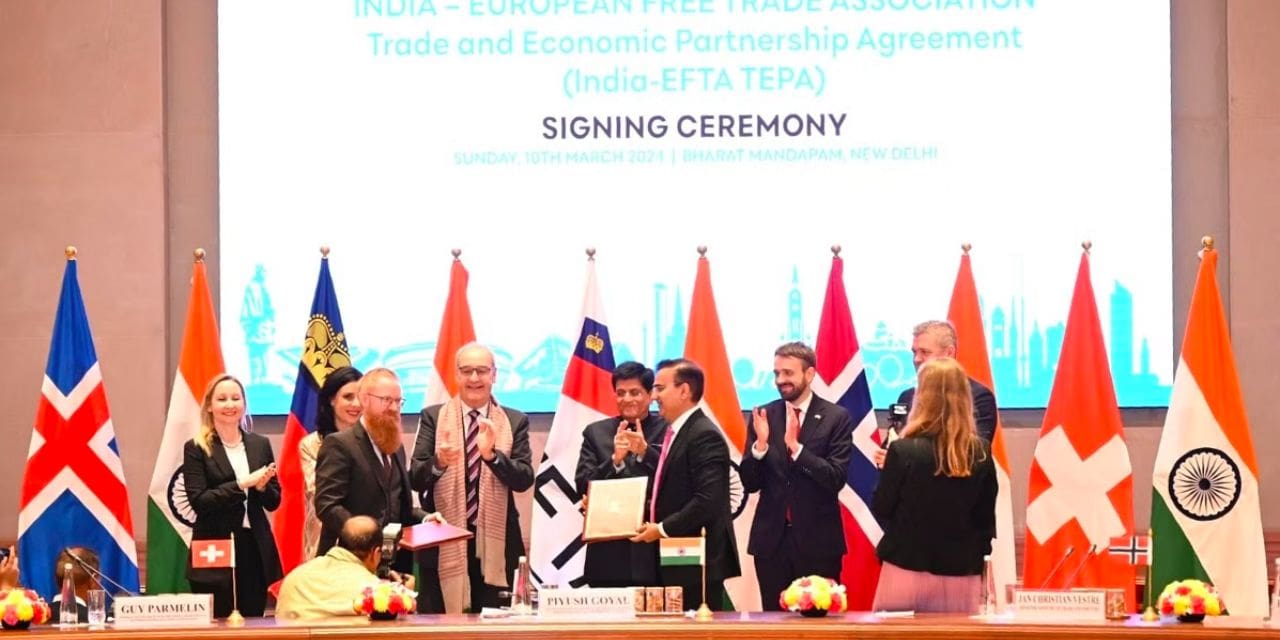India’s textile industry is set for a major boost following the signing of a free trade agreement (FTA) with the European Free Trade Association (EFTA) countries. This pact, the first of its kind between India and a European bloc, holds strategic significance and is expected to significantly increase trade and investment opportunities.
EFTA Commits to $100 Billion Investment: A key highlight of the agreement is EFTA’s commitment to promoting investments in India, aiming to increase the stock of foreign direct investment by a staggering $100 billion over the next 15 years. This investment is projected to generate 1 million new jobs in India.
Focus on Specialization and Collaboration: The agreement recognizes the complementary strengths of India and EFTA countries in the textile sector. Switzerland, an EFTA member, can provide India with specialised yarns, technology, and machinery, while India can offer raw materials and intermediate products for high-quality and sustainable end products. To further this collaboration, the Confederation of Indian Textile Industry (CITI) and Swiss Textiles signed a memorandum of understanding (MoU) to promote bilateral trade, knowledge sharing, and capacity building.
Multiple FTAs Enhance Textile Trade Strategy: The EFTA agreement comes alongside recent FTAs with the United Arab Emirates and Australia. Each of these trade pacts caters to the specific needs of the Indian textile industry. The UAE, a major importer of Indian textiles, is expected to see a further increase in trade. Similarly, the Australia deal secures duty-free import of specialised cotton varieties crucial for the Indian industry.
Addressing Challenges and Charting the Future:
- Export Decline: India’s textile and garment exports have faced challenges in recent years. While factors like the pandemic and global conflicts played a role, the industry is taking steps to address competitiveness concerns.
- Government Initiatives: The government is actively supporting the textile sector through various schemes like the Production Linked Incentive (PLI) scheme and the Pradhan Mantri Mega Integrated Textile Region and Apparel Park (PM-MITRA) scheme. Additionally, ongoing trade negotiations with major economies like the EU further highlight the government’s commitment to boosting textile exports.
- Focus on Man-Made Fibres and Technology: A key area of focus is increasing production and export of synthetic apparel. The industry is calling for a more gradual implementation of quality control measures to avoid disruption in the supply chain of raw materials. Additionally, early announcement of schemes promoting technological advancement and economies of scale is seen as crucial for long-term competitiveness.
- Sustainable Practices and Fast Fashion: The growing demand for sustainable and ethical clothing is another focus area. India has a strong ecosystem for sustainable fibres and renewable energy usage, but there’s a need to bridge the technology gap to meet stricter import requirements. Effective trade agreements that address non-tariff barriers can significantly aid Indian exporters in this regard.
- Diversification for Global Market: To compete effectively with major players, India needs to diversify its textile exports and move beyond its current cotton-dominated basket. The industry is advocating for a greater focus on man-made fibres and their blends, along with investment in developing indigenous capacities for manufacturing these fibres.
Overall, the signing of the EFTA trade agreement and the government’s focus on various initiatives position the Indian textile industry for significant growth and a larger share in the global market.

